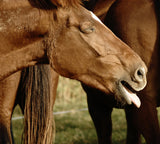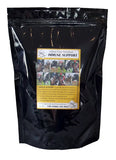Boosting immune function with nutrition
 At some point in most horse’s lives there are times when their immune system is particularly stressed: fighting infection, extremes of weather, transport, injury. Conditions such as allergies, exaggerated immune responses and autoimmune disease as well as chronic disease such as Cushing’s or insulin resistance are situations where the immune system is not functioning properly. Arguably though, perhaps the most frequent immune system stressor our horses face is heavy or prolonged exercise.
At some point in most horse’s lives there are times when their immune system is particularly stressed: fighting infection, extremes of weather, transport, injury. Conditions such as allergies, exaggerated immune responses and autoimmune disease as well as chronic disease such as Cushing’s or insulin resistance are situations where the immune system is not functioning properly. Arguably though, perhaps the most frequent immune system stressor our horses face is heavy or prolonged exercise.
Did you know that an 80km endurance ride suppresses the immune system for several days afterwards? Authors of a report published in the Equine Veterinary Journal concluded that “A prolonged bout of exercise results in a long-term suppression of the innate immune system function in horses which may, in part, account for the observed increase of infectious episodes in horses during training.” (PJ Robson, TD Alston, Equine Vet J. 2003 Mar;35(2):133-7). Another consequence of exercise is free radical damage. Free radicals are a by-product of burning energy for exercise. The body has a number of antioxidant enzyme systems which are its first line of defence against free radicals, but when the number of free radicals generated outstrips the body’s ability to deal with them, damage to cells occurs. For a horse in work this will likely lead to muscle soreness from muscle damage and poor performance related to impaired energy generation.
But before you shelve plans for that next endurance ride or three day event, the good news is that both the innate immune system and antioxidant enzyme systems can be supported with good nutrition.
Protein
Inadequate protein intake has a negative impact on the immune system. Protein is needed to manufacture enzymes, generate antibodies and cytokines and to support the rapid division of immune system cells.
The amino acid GLUTAMINE plays a key role in the innate immune system. Blood levels of glutamine drop in exercising horses. Low availability of glutamine can severely compromise the function of the immune system cells, which is not surprising when you realise how much glutamine is needed for in the immune system: Glutamine is needed to regulate T cell proliferation, cytokine production and cytokine sensitivity; regulate B cell antibody production and secretion; influence the number of activated killer cells; support macrophage activity; and provide an energy source for immune system cells. As if that wasn’t enough glutamine, and another amino acid METHIONINE, are needed for Glutathione Peroxidase, a crucial antioxidant system for all tissues, including the intestinal tract. The integrity of the intestinal wall is compromised during exercise in direct relation to intensity. The absorption of bacterial endotoxin from a 'leaky' intestinal wall plays a large role in heat stroke fatalities. Methionine, together with L-CARNITINE, is needed for the antioxidant acetyl-L-carnitine, and there is a further benefit to L-carnitine: increasing muscle adaptation to exercise for horses in work.
Vitamins
When we think about fighting infection we tend to think about Vitamin C and it is definitely an important antioxidant in the immune system. But before you go loading your horse up on Vitamin C a few words of caution: horses can synthesize their own vitamin C; if a horse is iron overloaded (horse have no way or excreting excess iron from their diet so this may apply to many horses) then Vitamin C actually worsens oxidative stress. If you want to supplement Vitamin C then keep the daily levels low, 1000mg/day.
Vitamin E is an important antioxidant which protects and stabilises every membrane in the body and protects muscle cells from free radical damage. Inadequate Vitamin E has been shown to result in a depressed immune function in horses. The more a horse exercises the more Vitamin E he needs, and it is important to note that blood levels drop off sharply during those times of year when horses do not have access to good grass at pasture.
B Vitamins support the active division of immune system cells and some also have specific immune system functions. Riboflavin is involved with the destruction of organisms by immune cells and thiamine is essential to normal T cell function in the immune system. Studies have shown that levels of folic acid drop in exercising horses, and folic acid deficiency has been clearly linked to increased infection risk.
MINERALS
Several minerals are needed in the antioxidant enzyme systems that are the body’s first line of defence against free radical damage. COPPER and ZINC are needed for the antioxidant enzyme Superoxide Dismutase, whilst SELENIUM is needed for Glutathione Peroxidase.
If you have a horse in work, or one whose immune system is being stressed, it pays to look at his diet. By ensuring he is getting adequate nutrients you can give his system what it needs to protect against free radical damage, and by providing quality protein you help support his innate immune system, helping your horse work harder, recover quicker and hopefully avoiding infections along the way.
|
RELATED PRODUCTS |
 |
| Immune Support |